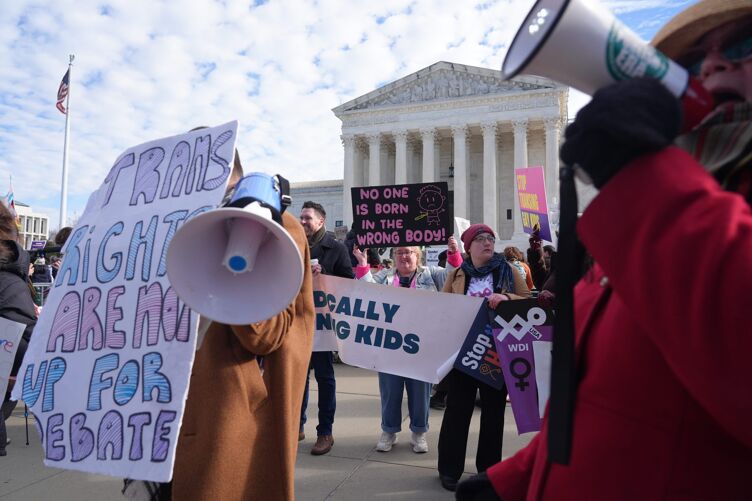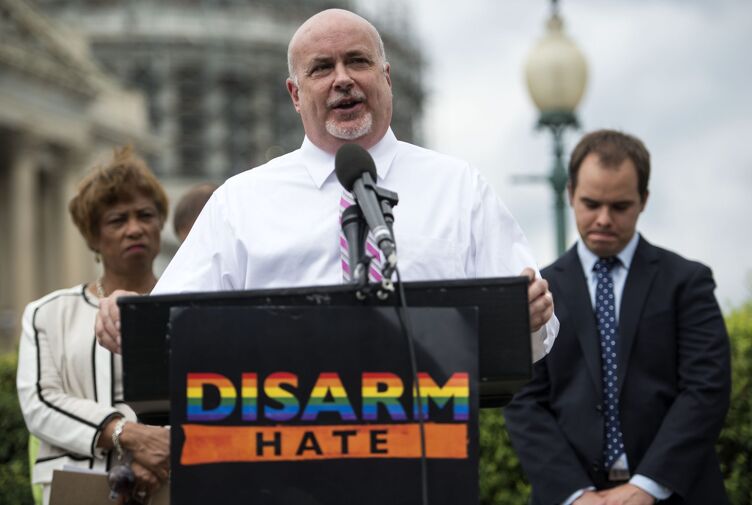On November 6, 2024, most LGBTQ+ people found themselves weighed down by shock, sadness, and anger after watching a man who campaigned heavily on dehumanizing attacks on the community handily win reelection to the White House.
And this time, his party gained a trifecta (control of the House of Representatives, the Senate, and the presidency), so Congress couldn’t be counted on to limit his excesses. The progress that will be erased, the rights that will be lost — it seemed all too overwhelming.
For the ever-pragmatic out Rep. Mark Pocan (D-WI), though, the time for sadness is over. Now, it’s time to fight.
“We have to be in the action stage,” he said in a conversation with LGBTQ Nation just before Donald Trump’s inauguration. “Anger and grieving have to be in the back window, and we have to be moving forward.”
Insights for the LGBTQ+ community
Subscribe to our briefing for insights into how politics impacts the LGBTQ+ community and more.
Related:
The former chair of the Congressional Equality Caucus (CEC)—the group of lawmakers working to promote equality for all, regardless of sexual orientation, gender identity, or sex characteristics—Pocan knows what’s going on regarding LGBTQ+ policy in Congress. With House Republicans hiding anti-LGBTQ+ measures as riders attached to larger appropriations bills (spending bills that must pass to keep the government funded), this knowledge is crucial.
Part of the problem with assessing how bad the next two years of Congress will be for LGBTQ+ people, Pocan said, is that it’s hard to know what campaign promises Trump will want to follow through on.
“What we know from [the] last time [that] Donald Trump was president, 90 percent of what he says is never going to happen,” Pocan said. “He just says stuff, you know, Greenland, Gulf of America, Canada, 51st state, right? There’s a lot of things.”
“We have to be in the action stage. Anger and grieving have to be in the back window, and we have to be moving forward.”
Rep. Mark Pocan (D-WI)
It’s too early in the session to know exactly what the broader GOP agenda will be this year, as several large appropriations bills have not yet been introduced in the House, but the warning flares have launched.
House Republicans have already passed one anti-LGBTQ+ bill this year, a federal ban on transgender students participating in school sports. It still faces an uphill battle in the Senate, where non-fiscal bills need 60 votes to overcome the filibuster and pass. Republicans have 53 seats in the chamber, meaning any bill will need some Democratic support to pass. The Republican House passed the same bill in 2023 but languished in the Senate.
Related:
When Pocan talked to LGBTQ Nation for our Queer State of the Union series last year, he was more confident that, despite Republican control of the House and growing anti-LGBTQ+ rhetoric from many Republicans, there was little to worry about because Democrats still controlled several key veto points.
“We’ve got the goalie in place,” he said at the time, referring to President Joe Biden, who could veto anti-LGBTQ+ legislation. Indeed, if the sports bill had somehow managed to pass in 2023, Biden would have vetoed it since it ran counter to his administration’s position on the issue.
The same isn’t true this year when the goalie is a member of the opposing team. Just a month ago, Trump told supporters that he would “stop the transgender lunacy.” His campaign spent over $215 million in ads attacking transgender rights, accusing Kamala Harris of being for “they/them” while he was “for you,” implying that transgender people aren’t even people worthy of being addressed.
Trump has laid out his opposition to trans rights on multiple issues, stressing how he would stop or curtail gender-affirming care for both young people and adults, participation in sports teams as their gender, schools teaching tolerance for LGBTQ+ people, and inclusion of trans people in the military.


Much of that will have to be approved by Congress. Republicans have already been able to advance some anti-LGBTQ+ legislation in the time since the election. This includes a measure in the National Defense Authorization Act (NDAA), the bill that funds the military, that bans gender-affirming care for the transgender children of military service members, as well as a bill to ban transgender students from participating in school sports.
Republicans could also try to pass a ban on gender-affirming care for trans youth at the federal level. Such a law would make it impossible for the families of trans youth to get their kids health care even by going out of state, as many are currently doing. Trump has said he supports such a ban, and Rep. Marjorie Taylor Greene (R-GA) has been introducing one in the House for years.
“We’re assuming that they’re going to bring [a ban on gender-affirming care] to the floor,” Pocan said.
Even with a Republican trifecta, there are still ways Democrats could gum up Republicans’ plans to strip away rights and basic protections. While Republicans gained control of the Senate in the 2024 elections, they lost some seats in the House. Currently, they can only lose one vote in the House before legislation fails as long as Democrats remain united against it.
This means that the House can still be a pressure point to stop the GOP’s anti-trans agenda, at least until special elections are held to fill some seats later this year.
“Just because of the dysfunction of the Republican caucus in general, they can only afford to lose one person,” Pocan said. “If there’s any Republican who has a conscience, [they] won’t vote with [their party], especially in these first few months, they’re not going to be able to pass some of this stuff.”
Pocan referred to last week’s anti-trans sports ban as an example of how that would work. Only two Democrats out of over two hundred voted for the bill—two Texas congressmen representing districts that voted for Trump over Harris. Pocan gave some of the credit for party unity on that bill to how Democrats framed it as giving license to school officials to conduct inspections of girls’ genitals to participate in school sports, with the Democratic Caucus even calling the bill the “Child Predator Empowerment Act” in the media.
“It’s a good way to explain what the bill is really about because it’s a solution looking for a problem which doesn’t really exist,” Pocan said, noting that local media in Rep. Susie Lee’s (D-NV) district “ran with that as the name of the bill and talked about that argument and why Susie Lee opposed it.”
Related:
One way Republicans could work around their narrow majority, Pocan warned, would be to put anti-LGBTQ+ measures in appropriations bills, as Republicans did with the NDAA in late 2024. The NDAA is a “jobs program” for many congress members’ districts, Pocan explained, which means that once an anti-LGBTQ+ measure is in the bill, even many Democrats would be unlikely to vote against it and face the wrath of workers who would lose jobs in their district in the next election.
“They’ll put it in big packages. We expect the reconciliation bill to be huge, the budget bill, the NDAA,” he said. “Again, certain must-pass bills is where, you know, they could try to put things, and then you don’t have to worry about a few Republicans that might have a conscience because it’s buried in something much bigger.”
It’s important to take Pocan’s description of a “Republican who has a conscience” with some precision. When asked about Rep. Nancy Mace (R-SC), who mounted a campaign to ban trans women from using the women’s facilities at the Capitol just after it became clear that Rep. Sarah McBride (D-DE) would be the first transgender person in Congress, Pocan’s words were withering.
“She’s clearly a fragile, somewhat broken human being,” Pocan said of Mace. “To tweet 300 times in three days about any subject, right? Anyone who does that, I think they really need to have a couple of conversations with people close to them about what’s going on.”


Pocan explained that it’s hard to know how to talk to someone like Mace because she’s trying to “get traction within the base for, likely, running for higher office” and lacks the sincerity of other, equally extreme, Republicans.
“It’s all about personal gain. I think even less of Nancy Mace than I do some of the other people that may actually believe it because of their background… but when someone is just a charlatan who’s doing things for their own selves, those folks are a lot harder to convince to do the right thing because they don’t have a moral compass that tells them what’s the right thing.”
But he stressed the importance of building bridges with the Republicans who can be reached, those Republicans “with a conscience.” He stressed how it’s essential for people in power to get to know transgender people. The current panic about transgender youth, which started just after former President Biden got into the White House in 2021, was a result of Republicans “throwing spaghetti against the wall for what would move conservative voters or move voters to vote Republican,” Pocan said.
He said that Republicans found that most Americans don’t know someone who’s transgender, a fact confirmed by GLAAD’s polling, which found in 2023 that only 28% of non-LGBTQ+ Americans say they know someone who is trans.
“We had this decades ago just fighting for gay and lesbian equality,” he explained. “If you don’t know someone, you can believe myths and lies a lot easier.”
Which could explain Pocan’s admiration for McBride. “Being the first anything is incredibly difficult,” he said.
“Her first and foremost focus has got to be on her district, and she talks about Delaware a lot,” he said. “But also she’s the real-life personification of these issues, and just by having, developing relationships in Congress, that’s going to have an impact.”


Outside of the House, Pocan stressed the Senate as a key place to stop anti-LGBTQ+ legislation, calling it an “important spot to be watching.” He also noted that the legal process will be important for protecting LGBTQ+ rights over the next few years.
Pocan also pointed out that there are more LGBTQ+ members of Congress now than ever before and more LGBTQ+ elected officials at the state and local levels.
“We still are moving forward; it’s just, this is a setback,” he said, taking a bigger-picture view of the impact Trump’s election to the White House will have on LGBTQ+ rights. “So for every couple steps forward, you’re gonna have one or two that go back. It’s part of the process.”
“But if we are all ready to fight when they do something that could be negative and try to prevent it before it even happens, we have to take those initiatives now… I just want to move everyone to the action stage because we need to all be ready to fight when they try to do something.”
Related:
Subscribe to the LGBTQ Nation newsletter and be the first to know about the latest headlines shaping LGBTQ+ communities worldwide.
Don’t forget to share:




